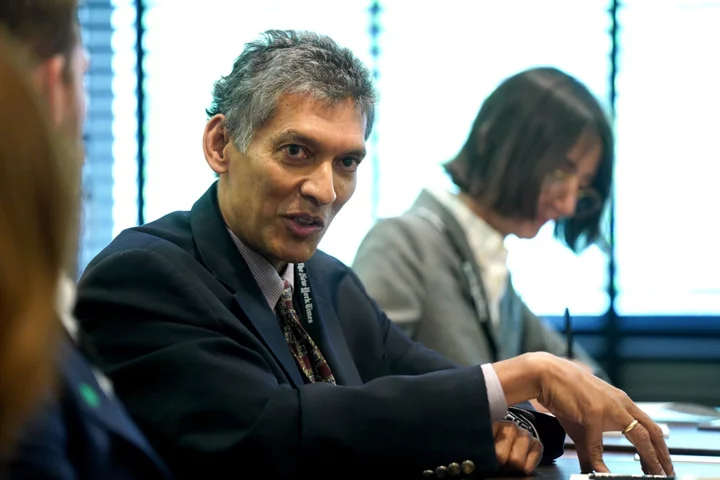China needs to keep cutting rates, roll out more stimulus and clarify the role it wants the private sector to play in the economy to restore confidence and help growth, a former International Monetary Fund official said.
The People’s Bank of China will need to further ease monetary policy this year should the country’s economic recovery continue to lose steam, according to Eswar Prasad, the former head of the IMF’s China division.
“The PBOC has already undertaken a couple of very modest moves, but I view those really as signaling that if the economy stumbles, then the PBOC is ready to act much more forcefully,” Prasad said Wednesday.
The ex-IMF official, who is now an economics professor at Cornell University, was attending the World Economic Forum’s Annual Meeting of the New Champions in Tianjin, China.
Market anticipation for more policy support has been growing in recent weeks as the economic rebound increasingly shows signs of weakening.
Those expectations were further fueled earlier this month when the PBOC cut policy interest rates — the first trim to those rates since last August. The State Council, China’s cabinet, has said it’s studying new measures, but it hasn’t announced any stimulus package so far.
Prasad cited a handful of tools the central bank could use this year, including to rely on targeted measures such as funneling credit into sectors able to promote growth and employment. The PBOC might also accelerate credit expansion by the banking and non-bank financial systems.
Rate cuts will be “an important part of that package,” he said.
Restoring Confidence
Sluggish consumer and business confidence is also a pain point for the economy, having been battered by years of Covid controls. Regulatory crackdowns have fueled concerns about unpredictable policy changes, further weighing on corporate activity.
Prasad said companies and investors are looking for officials to clearly spell out their views about private firms, and whether they will be allowed to thrive.
“The government seems to have a very schizophrenic attitude towards the private sector,” Prasad said. “They want the private sector to play a constructive role, but at the same time don’t want it to become too large and too powerful. And balancing that does create a lot of uncertainty in terms of the policy environment, which I think is holding back growth.”
Companies also need to contend with an uncertain external environment. US export controls limit China’s ability to move up the value-added chain into high-tech and emerging industries, Prasad said during a separate interview with Bloomberg Television on Thursday.
“China has an indigenous innovation policy in place, but I don’t think it’s quite ready to generate all the innovation it needs to really ramp up its ability to compete effectively in those new industries,” he said.
Prasad also said he sees a lot of “worrying parallels” between China and Japan and their economies. Many Chinese economists have in recent months debated whether China is on the brink of a so-called “balance sheet recession” — a term put forward by Nomura Research Institute economist Richard Koo to explain Japan’s prolonged economic stagnation started in the 1990s.
Chinese officials recognize the risks and are slowly trying to address them through efforts to move up the value chain, rebalance the economy so it’s more driven by consumption and promote the services sector instead of the property industry, Prasad said.
“Whether that will be sufficient to evade the sort of growth trap that Japan fell into is not clear at this stage,” he said. “But recognizing and acknowledging the problems is a pretty good start.”
--With assistance from Lucille Liu and Stephen Engle.
(Updates with additional comments from a Bloomberg Television interview.)

